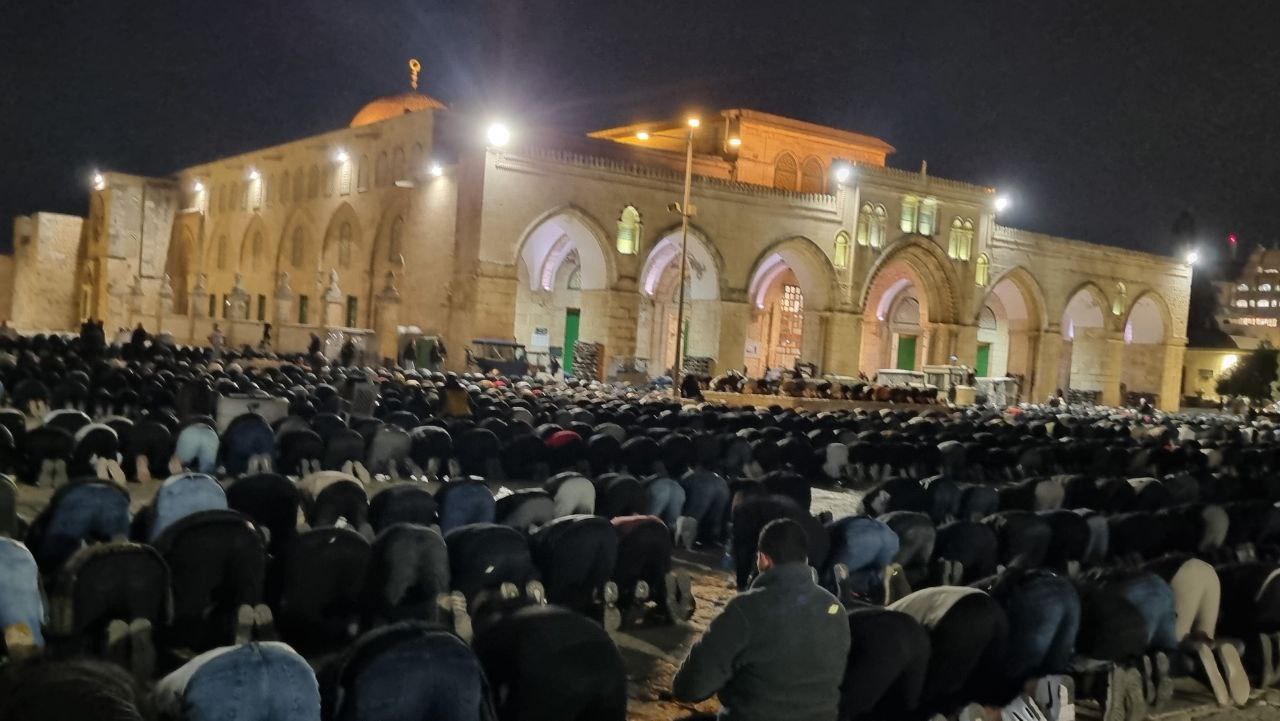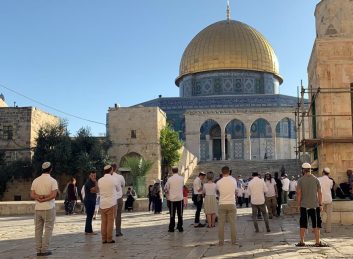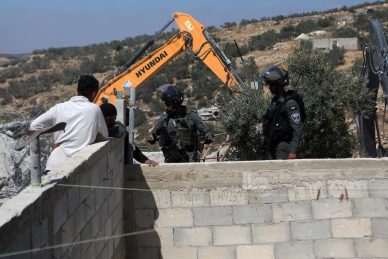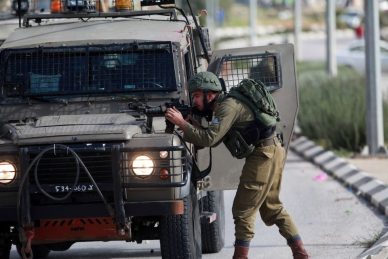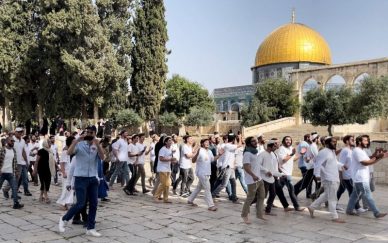OCCUPIED JERUSALEM, (PIC)
In a dangerous precedent not seen in a decade, the Israeli occupation police forcibly prevented worshippers from secluding themselves in the Aqsa Mosque as a religious rite on the first Friday of Ramadan. This reflects the extreme Netanyahu government’s frantic efforts to impose new realities and Judaizing policies that have long been sought by the radical Zionist right before the onset of the Al-Aqsa Flood battle.
This military aggression against the blessed Al-Aqsa Mosque has not occurred since the Gaza War in 2014, during which seclusion was allowed on Friday and Saturday nights and in the last ten days of Ramadan every year since 2015, except for 2020, when the Mosque was entirely closed to worshippers under the pretext of the Corona pandemic.
Pursuit of dominance
Ziad Ibhais, a researcher specializing in Jerusalem affairs, said in comments to the Palestinian Information Center that the occupation’s measures to prevent seclusion clearly indicate that it uses this prohibition as a marker of its dominance over Al-Aqsa. It prevents seclusion when its military power intensifies, as it did in Ramadan of 2014 during the Gaza War, and as it is doing today.
He noted that the occupation is forced to retreat from this prohibition when the will to protect the Mosque arises.
He emphasized that seclusion at Al-Aqsa is currently an indicator of the presence of Islamic identity at the Mosque and the ability of its people to protect it against the occupation’s aggression. The more the will to defend it and maintain a presence increases, the more its identity is protected, and the doors for seclusion are forcibly opened. Conversely, the more the occupier finds gaps to impose its will, the more it erases Al-Aqsa’s identity and closes the doors for seclusion.
The battle of seclusion before the flood
Ibhais warned that the Israeli control over the ritual of seclusion at Al-Aqsa recalls the seclusion battle that took place in Ramadan two years ago, specifically between March 28 and April 9, 2023, just six months before the Al-Aqsa Flood. At that time, it formed the first multi-front clash in support of Al-Aqsa and a preliminary confrontation before the flood.
He explained that at that time, the occupation had decided to ban seclusion throughout Ramadan, except for Fridays and Saturdays of each week and the last ten days of Ramadan. Recognizing the importance and specificity of this ritual in Al-Aqsa, the people of Jerusalem, 1948 occupied Palestine, and the West Bank rose, as they usually do, to enforce seclusion starting from the night of Tuesday, the sixth of Ramadan, March 28, 2023. The occupation police besieged the worshippers and expelled them from Al-Aqsa, and the scene was repeated on the night of Wednesday, the seventh of Ramadan.
He continued, “In the following week, on Tuesday and Wednesday nights, Ramadan 1444 AH (April 4 and 5, 2023), the scene was repeated with brutal aggression against the women worshippers and clashes at Al-Aqsa involving fireworks against rubber bullets, tear gas, sound bombs, and batons, until resistance in Gaza entered the fray, followed by rocket fire from southern Lebanon on Friday night and from the Golan Heights on Saturday night. On the night of Sunday, the 18th of Ramadan, April 9, 2023, the occupation police were forced to withdraw from around the Qibli Mosque and retract their warning to evacuate Al-Aqsa, fearing that the seclusion issue could turn into a full-scale war.”
The Jerusalem affairs researcher pointed out that this also brings to mind an issue that should have been behind us: that the prohibition or allowance of seclusion is a decision by the occupation police over an Islamic ritual at Al-Aqsa.
Maintaining seclusion throughout Ramadan is essential
He stressed that the correct and necessary stance to uphold is that seclusion during all days of Ramadan and throughout the year is an Islamic ritual and a pure right for Muslims at Al-Aqsa. The occupation’s control over it is part of its project to erase Al-Aqsa’s identity and Judaize it, as well as its long-term endeavor to impose transforming it into a temple. “We must all, including the Islamic Waqf Council, stand united against this aggression.”
Ibhais pointed out that this recalls practical experiences that illustrate how the door to seclusion at Al-Aqsa can be opened or closed. In Ramadan 1435 AH (July 2014), the occupation attempted to prohibit seclusion throughout Ramadan, including the last ten days, which resulted in a confrontation and the worshippers burned the occupying police station near the Dome of the Rock on the night of Friday, the 28th of Ramadan 1435 AH (July 25, 2014).
He concluded that following this incident, the door to seclusion was opened throughout the year during Ramadan 2015, which was the only Ramadan in Al-Aqsa’s history in which seclusion was allowed from the very first day.
Scholars of Palestine: Presence at Al-Aqsa is an obligation
For its part, the Scholars of Palestine reaffirmed their fatwa stating: “The presence at Al-Aqsa Mosque is a collective obligation upon all Muslims. People are divided into two groups: one comprising the people of Palestine who have the ability to reach Al-Aqsa, even with great difficulty; they must ensure a sufficient presence at the Mosque throughout the year. The second group includes the rest of the Muslims, who must assist those capable from Palestine and provide them with what they need. If sufficiency is not achieved, then the sin falls upon every accountable Muslim everywhere.”
The Scholars of Palestine sent a message emphasizing the necessity of presence and seclusion at Al-Aqsa, saying: “O youth of Jerusalem, the West Bank, and the occupied interior, defenders of the holy sites: march towards Al-Aqsa… overcome the obstacles… break the occupation’s decisions.”
Pray at the closest point
They also reiterated a previous fatwa issued by Sheikh Ikrema Sabri: “Pray at the nearest point, and you will receive the reward of praying at Al-Aqsa.” They also pointed out that this was a previous fatwa issued by Sheikh Sabri, the Grand Mufti of Jerusalem and the Holy Lands, in 2005, calling for mobilization towards Al-Aqsa and praying at the closest point for those prevented by the occupation from reaching it.
Call for presence throughout Ramadan
The preacher of Al-Aqsa Mosque, Sheikh Ikrema Sabri, called for increased presence and pilgrimage to the blessed Mosque during Ramadan. He stated: “Presence and worship at the blessed Al-Aqsa Mosque is an act of worship and a religious duty.” He urged every able Muslim to make the pilgrimage to Al-Aqsa to support and protect its sacred status.
Challenging occupation policies and foiling its plans
Widespread calls have emerged for a massive gathering at the blessed Al-Aqsa Mosque and for maintaining a presence in its courtyards to challenge the occupation’s policies and thwart its plans, particularly on the first Friday of the blessed month of Ramadan. The calls emphasized the necessity of increasing the presence at Al-Aqsa on Friday and in the coming days throughout the month of Ramadan, to thwart any Judaizing plans by the occupation authorities and settlement groups.
They stressed the importance of holding onto Al-Aqsa and protecting it in light of the dangerous circumstances threatening the Palestinian cause and its Islamic sanctities, especially concerning the occupation’s hints and the American administration’s plans aimed at liquidating the cause. They noted that everyone who can reach Al-Aqsa should maintain continuous presence in its blessed courtyards, to confront the violations of the occupation and the ambitions of settlers.

